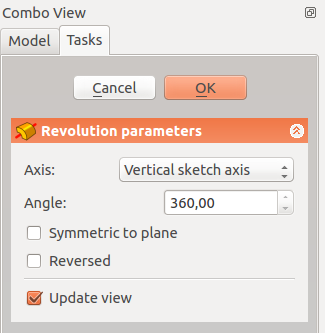PartDesign AdditiveHelix: Difference between revisions
| Line 49: | Line 49: | ||
* '''Select reference...''': allows selection in the 3D view of an edge on the Body, or a [[PartDesign Line|datum line]]. |
* '''Select reference...''': allows selection in the 3D view of an edge on the Body, or a [[PartDesign Line|datum line]]. |
||
=== |
===Mode=== |
||
This controls what parameters will be used to define the helix, Allowable choices are: Pitch-Height, Pitch-Turns and Height-Turns. |
|||
This controls the angle through which the revolution is to be formed, e.g. 360° would be a full, contiguous revolution. |
|||
===Pitch=== |
|||
The images in the [[#Examples|examples]] section demonstrate some of the possibilities with specifying different angles. It is not possible to specify negative angles (use the '''Reversed''' option instead) or angles greater than 360° . |
|||
The distance between turns in the helix. |
|||
===Symmetric to plane=== |
|||
===Height=== |
|||
If checked, the revolution will extend half of the specified angle in both directions from the sketch plane. |
|||
The height of the helix (center-center). |
|||
===Turns=== |
|||
The number of turns in the helix. Define as Height/Pitch |
|||
===Left handed=== |
|||
If checked, the turning direction of helix is reversed from default clockwise to counterclockwise. |
|||
===Reversed=== |
===Reversed=== |
||
If checked, the direction of |
If checked, the axis direction of helix is reversed from default. |
||
|} |
|} |
||
{{clear}} |
{{clear}} |
||
Revision as of 23:12, 5 February 2021
|
|
| Menu location |
|---|
| PartDesign → Create an additive feature → Additive helix |
| Workbenches |
| PartDesign |
| Default shortcut |
| None |
| Introduced in version |
| 0.19 |
| See also |
| None |
Description
The Helix tool creates a solid by sweeping a selected sketch or 2D object along a helix path.
The profile (B), is swept around axis (A) in order to produce the solid helix (C)
Usage
- Select the sketch to be swept into a helix. A face on the existing solid can alternatively be used.
- Press the File:PartDesign Additive Helix.svg AdditiveHelix button.
- Set the Helix parameters (see next section).
- Press OK.
Options
When creating an Additive Helix, the Helix parameters dialogue offers several parameters specifying how the sketch should be swept.
 |
AxisThis option specifies the axis about which the sketch is to be swept.
ModeThis controls what parameters will be used to define the helix, Allowable choices are: Pitch-Height, Pitch-Turns and Height-Turns. PitchThe distance between turns in the helix. HeightThe height of the helix (center-center). TurnsThe number of turns in the helix. Define as Height/Pitch Left handedIf checked, the turning direction of helix is reversed from default clockwise to counterclockwise. ReversedIf checked, the axis direction of helix is reversed from default. |
Properties
Below are properties which can be defined after creation of the feature. Data properties Base and Axis are uneditable.
- DataAngle: angle of rotation. See Angle.
- DataLabel: label given to the operation, can be changed at convenience.
- DataMidplane: true or false. See Symmetric to plane.
- DataReversed: true or false. See Reversed.
- DataRefine: true or false. If set to true, cleans the solid from residual edges left by features. See Part RefineShape for more details.
Examples

- Structure tools: Part, Group
- Helper tools: Create body, Create sketch, Edit sketch, Map sketch to face
- Modeling tools
- Datum tools: Create a datum point, Create a datum line, Create a datum plane, Create a local coordinate system, Create a shape binder, Create a sub-object(s) shape binder, Create a clone
- Additive tools: Pad, Revolution, Additive loft, Additive pipe, Additive helix, Additive box, Additive cylinder, Additive sphere, Additive cone, Additive ellipsoid, Additive torus, Additive prism, Additive wedge
- Subtractive tools: Pocket, Hole, Groove, Subtractive loft, Subtractive pipe, Subtractive helix, Subtractive box, Subtractive cylinder, Subtractive sphere, Subtractive cone, Subtractive ellipsoid, Subtractive torus, Subtractive prism, Subtractive wedge
- Transformation tools: Mirrored, Linear Pattern, Polar Pattern, Create MultiTransform, Scaled
- Dress-up tools: Fillet, Chamfer, Draft, Thickness
- Boolean: Boolean operation
- Extras: Migrate, Sprocket, Involute gear, Shaft design wizard
- Context menu: Set tip, Move object to other body, Move object after other object, Appearance, Color per face
- Getting started
- Installation: Download, Windows, Linux, Mac, Additional components, Docker, AppImage, Ubuntu Snap
- Basics: About FreeCAD, Interface, Mouse navigation, Selection methods, Object name, Preferences, Workbenches, Document structure, Properties, Help FreeCAD, Donate
- Help: Tutorials, Video tutorials
- Workbenches: Std Base, Arch, Assembly, CAM, Draft, FEM, Inspection, Mesh, OpenSCAD, Part, PartDesign, Points, Reverse Engineering, Robot, Sketcher, Spreadsheet, Surface, TechDraw, Test Framework
- Hubs: User hub, Power users hub, Developer hub